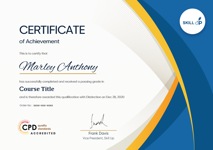
Basic Electricity and Electronics : Fundamentals of DC Circuit
CPD Certified | 12 Exclusive Video Lessons | FREE PDF Certificate| Instant Access| Expert Support
Skill Up
Summary
- Certificate of completion - Digital certificate - Free
- Certificate of completion - Hard copy certificate - £9.99
- Exam(s) / assessment(s) is included in price
- Tutor is available to students
Add to basket or enquire
Overview
►► Basic Electricity and Electronics : Fundamentals of DC Circuit ◄◄
Unlock the mysteries of electricity and electronics with our comprehensive course - Basic Electricity and Electronics: Fundamentals of DC Circuit. Are you ready to embark on a journey into the fascinating world of electrons, circuits, and power? Delve into the very essence of modern technology as we unravel the fundamental principles that govern electricity and electronics.
In this electrifying Basic Electricity and Electronics : Fundamentals of DC Circuit course, we will start by exploring the basic concepts of electricity, from understanding its nature to distinguishing between conductors and insulators. Through engaging modules, you will discover the flow of current, delve into Ohm's Law, and explore the intricacies of electric power. As you progress, you'll unravel the mysteries of series and parallel circuits, grasp essential circuit theorems, and unlock the secrets of electric fields and capacitance.
Prepare to be captivated by the magnetic allure of magnetism and inductance, and gain insights into transient responses involving capacitors and inductors. Each module is designed to provide you with a solid foundation in DC circuitry, empowering you to comprehend complex electronic systems with confidence and clarity.
This Basic Electricity and Fundamentals of DC Circuit Consists of the Following Title Course:
- ➽ Course 1: Basic Electricity and Fundamentals of DC Circuit
Key Features of Basic Electricity and Fundamentals of DC Circuit:
- Accredited by The CPD Certification
- Fully online, Instant Access
- Developed by expert professionals
- Instant PDF certificate
- Self-paced learning and laptop, tablet, smartphone-friendly
- 24/7 Expert Support
Learning Outcomes of Basic Electricity and Fundamentals of DC Circuit:
- Understand the fundamental principles of electricity and electronics.
- Identify and differentiate between conductors and insulators.
- Apply Ohm's Law to analyze electric circuits effectively.
- Analyze series and parallel circuits and their applications.
- Utilize circuit theorems to solve electrical problems efficiently.
- Demonstrate an understanding of electric fields, capacitance, magnetism, and inductance.
- Interpret transient responses involving capacitors and inductors.
CPD
Course media
Description
Start on a captivating exploration of the intricate world of "Basic Electricity and Electronics: Fundamentals of DC Circuit." This course serves as a gateway to unraveling the foundational principles governing electricity and electronics. From understanding the very essence of electricity to deciphering complex circuit theorems, participants will immerse themselves in a dynamic learning experience designed to illuminate the mysteries of DC circuits. With a focus on clarity and comprehension, this Basic Electricity and Electronics course equips learners with the essential knowledge to analyze, interpret, and manipulate electrical systems effectively. Join us on a journey where theory meets application, and unlock the potential of electricity and electronics in the modern world.
Course Curriculum of Basic Electricity and Fundamentals of DC Circuit:
- Module 01: Intro Basic Electricity
- Module 02: The Nature of Electricity
- Module 03: Conductors & Insulators
- Module 04: Current and Electric Circuits
- Module 05: Ohm’s Law
- Module 06: Electric Power
- Module 07: Series & Parallel Circuits
- Module 08: Circuit Theorems
- Module 09: Theorem Example Explained
- Module 10: Electric Fields and Capacitance
- Module 11: Magnetism and Inductance
- Module 12: Transient Response Capacitors & Inductors
Assessment
After completing all the modules of the Basic Electricity and Electronics: Fundamentals of DC Circuit course, your learning will be assessed by an assignment or multiple-choice based exam. You may choose to participate in a Mock Exam before attending the course completion Final Exam with no extra cost.
Who is this course for?
This Basic Electricity and Electronics : Fundamentals of DC Circuit course is ideal for those who wish to gain a deeper understanding of the basics of electricity and electricity, such as:
- Students pursuing studies in electrical engineering or related fields
- Professionals seeking to enhance their understanding of electricity and electronics
- Individuals interested in learning the fundamentals of DC circuits
- Enthusiasts eager to explore the mysteries of electricity and electronics
- Anyone looking to expand their knowledge and skills in electrical systems.
Requirements
For this Basic Electricity and Electronics : Fundamentals of DC Circuit course, you don't need any formal qualifications.
Career path
This Basic Electricity and Electronics : Fundamentals of DC Circuit course will lead you to many different career opportunities. Such as:
- Electrical Engineer: £30,000 - £50,000
- Electronics Technician: £25,000 - £35,000
- Electrical Designer: £28,000 - £45,000
- Circuit Designer: £30,000 - £55,000
- Electronic Design Engineer: £32,000 - £60,000
- Control Systems Engineer: £35,000 - £70,000
Questions and answers
Currently there are no Q&As for this course. Be the first to ask a question.
Certificates
Certificate of completion - Digital certificate
Digital certificate - Included
This Basic Electricity and Electronics : Fundamentals of DC Circuit course comes with FREE CPD Accredited PDF certificates, making this an excellent value for money.
Certificate of completion - Hard copy certificate
Hard copy certificate - £9.99
Get a CPD Accredited Hard Copy certificate for £9.99 per copy. The delivery fee for the Hard Copy certificate, however, is free for UK residents, whereas it costs £10 for international students as delivery charge.
Reviews
Currently there are no reviews for this course. Be the first to leave a review.
Legal information
This course is advertised on reed.co.uk by the Course Provider, whose terms and conditions apply. Purchases are made directly from the Course Provider, and as such, content and materials are supplied by the Course Provider directly. Reed is acting as agent and not reseller in relation to this course. Reed's only responsibility is to facilitate your payment for the course. It is your responsibility to review and agree to the Course Provider's terms and conditions and satisfy yourself as to the suitability of the course you intend to purchase. Reed will not have any responsibility for the content of the course and/or associated materials.




